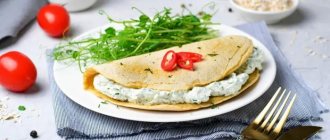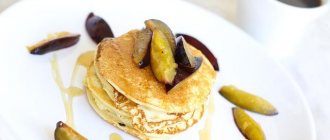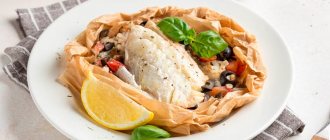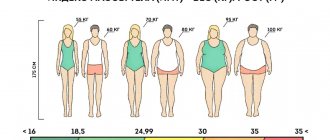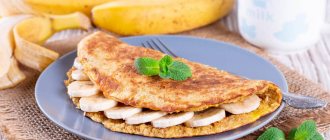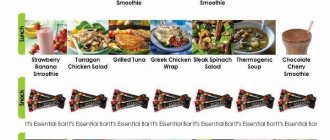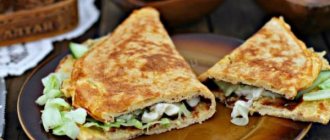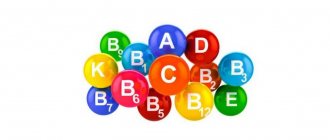Running has many advantages, because thanks to cross-country, the athlete is endowed with not only physical strength, but also spiritual strength. For jogging to be beneficial, it is important to take nutrition seriously, both before and after training. The diet of a running athlete depends on whether the person wants to build muscle, wants to maintain tone, or say goodbye to excess weight. Eating balanced, healthy meals will significantly increase a person’s chances of achieving the desired result.
What is special about nutrition after running?
An hour after a complete run, the body needs to be saturated with carbohydrates. Neglecting this rule can lead to a malfunction of metabolism and liver function. In addition, the body may begin to process proteins instead of carbohydrates, which can negatively affect the athlete’s well-being. This may manifest itself as a feeling of exhaustion and a constant desire to sleep.
There is approximately one gram of carbohydrates per kilogram of body. For example, one hundred grams of buckwheat and oatmeal contain about seventy grams of carbohydrates and twenty grams of protein. Such food can completely restore the body’s carbohydrate balance after training.
Immediately after training, it is important for an athlete to begin replenishing carbohydrates. This can be done by taking some juices. Juice from tomatoes, grapes or citrus fruits is perfect. A protein shake will also be helpful.
General principles of nutrition[edit | edit code]
The decision to run a marathon is a serious reason to carefully analyze your current lifestyle and, possibly, rebuild it. Accordingly, issues of catering should also come into view. I feel great in Norway because it is easy to provide myself with food for a well-balanced diet. In fact, throughout my entire sports career, I ate what I was used to eating since childhood. It turned out that the foods I was accustomed to were indispensable for the marathon.
Norwegians have access to an abundance of fresh food. I eat a lot of fruits and vegetables, love freshly baked whole grain bread and popular Norwegian cheeses, especially Gjetost and Jarlsberg, which, by the way, are sold all over the world.
Norwegians eat a lot of fish. We have a lot of it, and it's inexpensive. I eat fish at least twice a day: during second breakfast and for lunch.
When running a marathon, you need to be thoughtful about nutrition and use only healthy foods. When I travel a lot, I always have a small supply of simple and healthy food with me. As a rule, these are non-perishable foods (whole grain crackers, nuts). In addition, I take fruits and sandwiches on the road.
How long after running can you eat?
After finishing a run, the body experiences an acute lack of fat. Therefore, all the subcutaneous fat that you really want to get rid of is used. That is why eating fatty foods after training is strictly not recommended. Otherwise, there will be no point in a perfect cross.
Eating after a run depends on the timing of the run:
Running in the morning . If a person’s goal is to lose extra pounds, then he should stop eating in the first hour after the cross-country. If you are very hungry, you can drink plain water or tea without sugar. As a last resort, you can eat one apple, but before that you should wait at least half an hour. We discussed running on an empty stomach in more detail in this article.
Running during the day . Meals should be fractional. Each serving should be about two hundred to three hundred grams. After training during the day, you should refrain from eating food for the first forty to fifty minutes;
Running in the evening . If an athlete plans to rest after training, then at night you can drink about half a liter of one percent kefir or eat no more than one hundred and fifty grams of low-fat cottage cheese. This meal should occur an hour after the cross.
By the way, we have already considered the question of what time is best to run - in the morning or in the evening.
Content
- 1 Nutritional features
- 2 General principles of nutrition
- 3 Daily diet 3.1 Breakfast
- 3.2 Second breakfast
- 3.3 Lunch
- 4.1 The carbohydrate myth
- 5.1 Before running
- 6.1 What to drink
What can and cannot be eaten after running?
When a person decides to play sports, the main incentive will be daily observation of results. No matter what goal a runner pursues, in order to get benefits for the body, you need to follow the right lifestyle. You should forget about bad habits forever. There is a list of products that can saturate the human body with extremely useful microelements, and this especially applies to those who have adopted sports into their lives.
Recommended Products Table
| Can be used: | It is worth giving up: |
| a variety of porridges, such as buckwheat, oatmeal, rice, wheat; bananas; green tea; dried fruits, berries; whole grain bread only; veal; chicken breast; salmon; eggs; legume products. | any kind of fast food; bacon; energy and alcoholic drinks; fatty and too sweet treats; all fried foods without exception; melons; bell pepper; broccoli. |
After training, as well as during it, it is important not to drink carbonated mineral water. In addition, you should completely avoid drinking drinks containing caffeine and cola.
Alcohol after exercise
About alcohol from the book “Nutrition in Endurance Sports”:
Consuming large quantities of alcohol soon after training or competition can slow down the body's recovery. It is a diuretic that causes the body to excrete more fluid than it takes in, so losses need to be replaced even after moderate amounts of alcohol. It also disrupts the synthesis of glycogen - carbohydrate fuel - in the muscles and liver. Alcohol dilates blood vessels: this is worth thinking about with bruises and soft tissue damage. Swelling and bleeding worsen, interfering with healing.
Should you eat before your morning run?
“The most effective morning workout is jogging on an empty stomach.” Many newbies think so. This misconception especially concerns girls who want to lose weight quickly. After all, after burning glycogen reserves in the muscles, hated fats begin to break down.
However, this tactic is not correct.
An unprepared body can experience hypoglycemia under high load on an empty stomach - there is a risk of even losing consciousness!
The effectiveness of training on an empty stomach is extremely low. The body gets tired quickly, there is no progress, it is difficult to increase the pace with each race.
Before your morning run, be sure to eat.
What to eat after running to lose weight?
It is important for a person to accurately calculate the amount of carbohydrates and proteins needed. You need about one gram of carbohydrates per kilogram of the athlete’s total weight, and about thirty grams of proteins. A runner can eat porridge cooked with milk. For example, rice, wheat, semolina or oatmeal. If desired, you can add a little honey or fruit. Ball pasta or potatoes are great. These dishes will fill the body wonderfully, but it is worth remembering that the food must be prepared correctly.
There is a misconception that eating carbohydrates after a workout will only lead to weight gain. Experts say that within an hour and a half after intense exercise, the body actively replenishes glycogen reserves that were spent during the cross-country. If the body is not given carbohydrates, it will respond by malfunctioning some systems. Glycogen will begin to be replenished with proteins. This process will significantly reduce the runner’s endurance and also nullify the effect of jogging.
It is important not to forget about the drinking regime. Before training, it is important to limit fluid intake to two hundred milliliters. This measure will help prevent problems with the kidneys, vascular system, and heart.
Basic mistakes
Beginner runners make mistakes that significantly reduce the effect of training.
These include:
- irregular or short-term (less than 1 hour) classes;
- incorrect time of day (too early morning or late evening);
- during exercise, the stomach is empty or full;
- clothing or shoes do not match the runner’s size or time of year;
- The jogging area has difficult terrain: soft soil, slippery slopes, etc.
Running will be a great help in the fight against excess weight. By supplementing regular exercise with a proper diet, you can achieve visible results in the first 2-3 months.
Tips from the book “Diet of Champions”
Milk Of particular importance to professional athletes, both important proteins found in milk - whey protein and casein - have been scientifically shown to protect muscles during intense physical activity and speed up muscle recovery after training.
Yogurt Try this: Eat yogurt with fruits and nuts after at least some workouts. This is a great recovery snack not only for its nutritional benefits, but also because it is easy to prepare and digestible, especially after a tough workout.
Beets are high in beta-alanines, a type of antioxidant that has unique anti-inflammatory properties. Therefore, beets are an excellent product to help restore after heavy exercise. Beetroot juice is very beneficial for athletes. It contains high levels of nitrates, which help blood vessels dilate during exercise, increasing blood and oxygen supply to the muscles. In addition, nitrates cause mitochondria in muscle cells to generate energy more efficiently.
Tea Despite the presence of caffeine, tea provides the human body with liquid in almost the same way as plain water. For Kenya's elite runners, tea is their main source of hydration and they prefer it with plenty of milk and sugar. In this form, it becomes especially beneficial after intense training, providing the body with fluid, the muscles with carbohydrates, the entire body with protein, as well as antioxidants to counteract oxidative stress.
Planning your diet before training/competition
It’s easy for a beginner to get confused in so much information. An approximate diet will clearly demonstrate what kind of food before running is good:
Low to medium intensity
Training in the morning. In 30 minutes:
- Banana + 2 oatmeal cookies + tea with honey;
- Oatmeal on water with jam + juice;
- 2 toasts with jam + sweet tea.
Day/evening training. In 2 - 3.5 hours:
- Buckwheat porridge + a minimum of vegetables (1 carrot, 2 tomatoes, seaweed);
- Pasta + vegetables (similar).
High intensity
High-intensity workouts require a lot of energy. Be sure to eat well the day before your run and replenish your glycogen reserves:
- Brown rice + lean meat + vegetables;
- Buckwheat porridge + lean fish + vegetables;
- Pasta + legumes + vegetables.
For long distances, if necessary, take a snack with you:
- Banana + carbohydrate bar;
- Sweet juice + oatmeal cookies.
Preparing for a marathon/competition
Professional athletes know the secret of preparing for competitions.
A week before the marathon, the runner eats only protein foods for 2 days. The body is completely freed from glycogen reserves.
The rest of the days before the race, the basis of the diet consists of slow carbohydrates. Due to a previous glycogen deficiency, the body begins to store it much more actively.
Before competition, the glycogen reserve in the muscles turns out to be very high!
Important details[edit | edit code]
The Carbohydrate Myth[edit | edit code]
It is widely believed that carbohydrates make people fatter. I disagree: extra weight is a consequence of extra calories. Carbohydrates are healthy, especially those found in fruits, vegetables and grains. They should definitely be on your sports menu. Products containing starch are useful: a variety of pasta, rice, potatoes. Nancy Clark argues that refined carbohydrates, such as sugar and carbonated drinks, are also beneficial when consumed in moderation.
You don't have to go on a diet[edit | edit code]
By training for a marathon, you are sure to lose weight, even without following fad diets. Nancy Clark believes that there is no need to think about diets at all, you just need to consume healthy food. Then the weight loss happens on its own (if not, then you may weigh exactly what you should weigh). If you still have the desire to lose weight, follow Nancy's advice: do not deprive yourself of the happiness of eating a varied diet, but simply eat less (reduce the amount of food you consume so much as to reduce your calorie content by about 20%). Eat more for breakfast and lunch, and only have a light snack in the evening. If you feel hungry during the day, you can eat some foods containing vegetable fats (for example, an avocado, a few nuts, a slice of bread soaked in olive oil). Don't worry about your weight. At the marathon, look around and you may realize that your body structure is genetically predetermined.
Don't be too hard on yourself[edit | edit code]
Nancy Clark does not recommend searching for a “magic diet” for weight loss. Never skip a meal if you are hungry, and do not deny yourself the pleasure of eating candy. Every day, the body produces up to 10% of energy from sugar. To do this, just eat three small cookies or a serving of ice cream. Up to 25% of energy comes from foods containing fatty components. At the same time, it is better to consume healthy fats, such as olives, vegetable oil, etc. Nancy Clark completely allows the consumption of her favorite foods high in carbohydrates and fats. When I was working out, I used to enjoy caramel or ice cream after lunch. It was a kind of ritual; I looked forward to this moment as a reward for completing the workout and never felt guilty.


